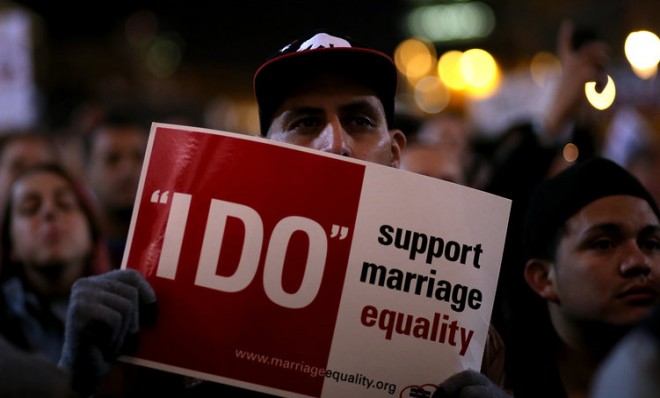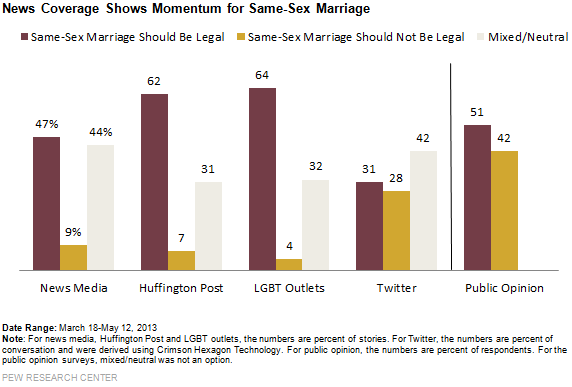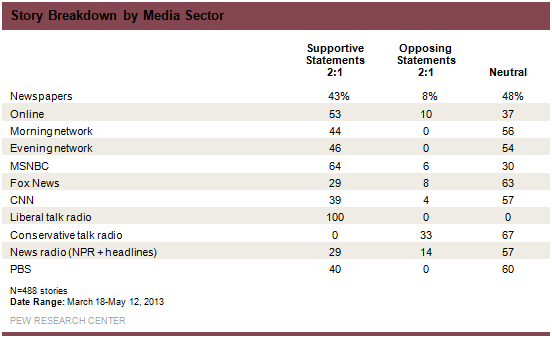Is the momentum for gay marriage real, or just media hype?
A new Pew study shows media coverage this year tilted toward positive coverage of same-sex marriage by a 5-to-1 margin


A free daily email with the biggest news stories of the day – and the best features from TheWeek.com
You are now subscribed
Your newsletter sign-up was successful
Some time in the next week, either on Thursday or Monday, the Supreme Court is expected to hand down two big rulings on same-sex marriage. Around the time the high-court justices were hearing the high-profile cases in March, the media was dedicating a lot of ink and pixels to the subject — and the coverage wasn't evenly divided between supporters and opponents of gay marriage, according to a new study from Pew.
In fact, it wasn't even close, say Paul Hitlin, Amy Mitchell, and Mark Jurkowitz at Pew's Project for Excellence in Journalism. In nearly 500 articles and TV segments from March 18 to May 12, "stories with more statements supporting same-sex marriage outweighed those with more statements opposing it by a margin of roughly 5-to-1."
In the news media, supportive stories — where pro–gay marriage views outnumbered opposition by at least a 2-to-1 margin — made up 47 percent of coverage, versus 9 percent favoring anti–gay marriage views, Pew found. The Huffington Post — which, to be fair, has a dedicated "Gay Voices" section — had the most, and most tilted, coverage (62 percent pro, 9 percent anti) of a mainstream news source, Pew says, while The Wall Street Journal and USA Today "stood out for higher levels of mixed or neutral reporting, 70 percent and 67 percent, respectively, and more even ratio of supporting versus opposing stories."
The Week
Escape your echo chamber. Get the facts behind the news, plus analysis from multiple perspectives.

Sign up for The Week's Free Newsletters
From our morning news briefing to a weekly Good News Newsletter, get the best of The Week delivered directly to your inbox.
From our morning news briefing to a weekly Good News Newsletter, get the best of The Week delivered directly to your inbox.

The breakdown by media category falls along somewhat predictable lines: Conservative talk radio tilted toward gay-marriage opposition, while liberal talk radio was 100 percent in support, for example. But there are a few surprises, too — like that NPR had almost twice as many opposing voices as Fox News. All in all, though, Pew says, "the news media coverage provided a strong sense of momentum towards legalizing same-sex marriage."

That outcome can be explained by some logical reasons, says Brian Stelter in The New York Times. As the researchers note, many of the developments that prompted the news articles were intrinsically positive for gay-rights proponents, including politicians coming out in favor of gay marriage or states legalizing it. Still, Stelter says, "the study lends credence to conservative charges that the nation's news media have championed the issue of same-sex marriage at the expense of objectivity."
No kidding, says Rich Lizardo at The American Spectator. "The report might as well have been titled 'The Sky Is Blue' because this only confirms what everyone already knew." The only surprise, in fact, is that "news outlets such as The Huffington Post (explicitly cited in the study) and The New York Times are covering this story."
Yes, says Taylor Colwell at Townhall, "this study confirms what most of us already suspected: That the surge in public support for gay marriage has been a phenomenon largely driven by the media." When it comes to unpacking media bias, "the perpetual question is whether the media is a molder or reflector of public attitudes." But in this case, the answer seems pretty clear, Colwell says.
A free daily email with the biggest news stories of the day – and the best features from TheWeek.com
There's little doubt that gay marriage is in vogue — 70 percent of young adults (ages 18 to 29) are in favor. As the group most engaged with new media trends and thus most susceptible to media bias, this demographic's overwhelming support is a strong indicator of media's seminal role in shaping gay marriage opinions.... Reporting bias in the Pew study was 47 percent in favor to 9 percent opposed; that study registers present public support as 51 percent in favor to 42 percent opposed. Media favoritism for gay marriage far outstrips that of the public at large. [Townhall]
Looking at the numbers, "it's easy to simply assume that the media is pushing an agenda rather than reporting the facts," says Chris Cillizza at The Washington Post. But that's an overly simple way to look at the study. First of all, there was a whole lot of neutral or balanced coverage, and the pro–gay marriage tilt to the rest of the stories is partly explained by the better organization and more compelling argument (fight for civil rights) on the gay-rights side, Cillizza says. Also, "there is a bit of chicken and egg going on here."
Lots and lots of polling done over the last few months suggests that public opinion is in fact moving – across virtually every demographic measure — in favor of legalization of same sex marriage. So, while the Pew study does show real and significant opposition to allowing gay people to marry, the coverage focuses on what's new(s), which is the movement toward legalization.
All that said, it's important to remember that regardless of how the Supreme Court rules in the coming weeks on DOMA and Prop. 8 — and how it's covered — the opposition to broad-scale legalization of gay marriage remains a very real thing, particularly among social conservatives who could well play a critical role in choosing the identity of the next Republican presidential nominee. [Washington Post]
Peter has worked as a news and culture writer and editor at The Week since the site's launch in 2008. He covers politics, world affairs, religion and cultural currents. His journalism career began as a copy editor at a financial newswire and has included editorial positions at The New York Times Magazine, Facts on File, and Oregon State University.
-
 The ‘ravenous’ demand for Cornish minerals
The ‘ravenous’ demand for Cornish mineralsUnder the Radar Growing need for critical minerals to power tech has intensified ‘appetite’ for lithium, which could be a ‘huge boon’ for local economy
-
 Why are election experts taking Trump’s midterm threats seriously?
Why are election experts taking Trump’s midterm threats seriously?IN THE SPOTLIGHT As the president muses about polling place deployments and a centralized electoral system aimed at one-party control, lawmakers are taking this administration at its word
-
 ‘Restaurateurs have become millionaires’
‘Restaurateurs have become millionaires’Instant Opinion Opinion, comment and editorials of the day
